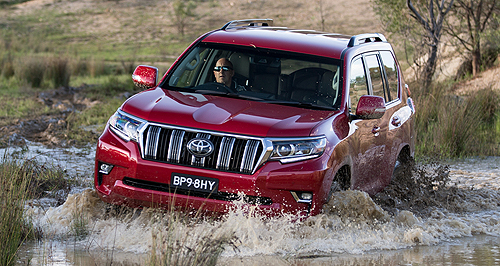Make / Model Search
News - ToyotaToyota faces class action on diesel filtersUnbreakable or not: Toyota’s HiLux might be Australia’s most popular vehicle, but its diesel particulate filter (DPF) has put at least some owners offside. 2.8-litre diesel HiLux, Prado and Fortuner owners sign up to sue Toyota2 Aug 2019 A CLASS action against Toyota Australia over clogged diesel particulate filters (DPF) on 2.8-litre HiLux, Prado and Fortuner models has been lodged in the Federal Court on behalf of a unknown number of customers.
The action – filed jointly by law firms Bannister Law and Gilbert and Tobin after a long-running wrangle between some unhappy owners and Toyota – comes even as Toyota claims to have taken action to fix the problem that has affected up to 250,000 Toyota vehicles fitted with the pollution-cutting device since October 2015.
The claimants are suing Toyota for loss of vehicle value, costs of excessive fuel consumption, costs connected with the inspection, servicing and repair of the affected vehicles and lost income for when their vehicle is off the road.
Toyota has declined to comment on the matter while it is before the courts, but has issued a short statement encouraging owners with concerns about diesel DPFs to contact their Toyota dealer or the Toyota Guest Experience Centre.
The HiLux has been Australia’s top-selling vehicle for the past three years, while the Prado has been the top 4x4 SUV for serious off-roaders even longer.
In documents filed by the lawyers, Toyota has been accused of conduct that was “misleading or deceptive and, in the circumstances, unconscionable”.
The class action claims the DPF devices fitted to certain HiLux, Prado and Fortuner vehicles are defective, and that the vehicles fail to comply with the statutory guarantee for acceptable quality under Australian consumer law.
The period covered by the class action runs from October 1 2015 until July 26 2019.
According to official VFACTS sales data, Toyota sold more than 250,000 HiLux, Prado and Fortuner vehicles in that period. HiLux made up 176,000 of those sales.
Essentially, the law suit claims the DPFs fitted to the 2.8-litre diesel engine do not cleanse themselves properly by periodically burning off particulates – essentially soot – trapped in the system in a process called regeneration that heats the exhaust.
If the in-built regeneration system fails, the soot builds up in the filter, blocking it and causing other problems including loss of power, higher fuel consumption and increased exhaust smoke.
“The affected vehicles experiencing these issues require time consuming and costly repairs, including repeated vehicle servicing and repeated replacement of the DPF in its entirety,” the class action claims.
The filters are required to trap particulates because the sooty residue common from burning diesel can be carcinogenic.
Toyota is accused of knowing about the problem since February 2016.
The lawsuit is going ahead even though Toyota has told journalists that it is on top of the problem.
It has replaced affected DPFs and fitted a manual regeneration button so owners can burn off sooty residue periodically.
This system is now fitted to all new 2.8-litre diesel Toyotas, and can be retro-fitted free to others.
Although the class action does not mention the Toyota LandCruiser – the Japanese brand’s biggest SUV in Australia – some owners have claimed to experience similar DPF issues in recent years.  Read more |
Click to shareToyota articlesResearch Toyota Motor industry news |










Facebook Twitter Instagram